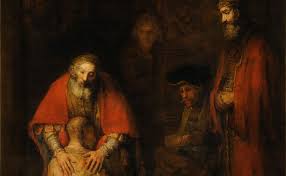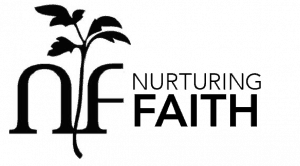Lessons from the Prodigal Son
I was once in a study course on forgiveness as a part of the Spiritual Formation Certification program at Columbia Theological Seminary in Decatur, GA. We were blessed and enriched spiritually to have Marjorie Thompson as the facilitator. In one session, we focused on the story of the prodigal son recorded in Luke 16:11-32; and an interesting question arose in observing the stance of the older brother toward his father. With the father representing God our Heavenly Father in the parable, we see the oldest son expressing deep anger and resentment toward the father. So, let’s be honest. Do we need to forgive God the Father? When the question was posed, it took my breath! But, it was an intriguing question. Are we holding resentment toward God? Does this great parable show us that we may need to rethink our understanding of God—and the way we engage our relationship with God? What are our expectations and are they valid?
In this story, the father does not hold the youngest son accountable for his sins. At least that is the way the dutiful older brother sees it when he hears the sounds of the party and hears that the degraded son was wearing a family robe, slippers and ring. The older brother sees a display of favoritism and a breach of equity, which gives him a sense of being taken for granted. He becomes highly offended. In the reflection on the older brother’s anger toward his father and brother, is Jesus helping us to see that we have a similar problem toward God and our “brothers”? Are we disappointed in the way God rules with regard to what we see as failures in others? Are we holding out for judgment rather than forgiveness?
This story truly reveals that the reign of the Kingdom of God is a reality beyond anything we can imagine. As William Countryman expresses it, we get to share in “God’s extraordinary, forgiving generosity.”[1] To understand it requires “metanoia”—a transformation of mind beyond our typical cultural mindset, past wrongs and coveted beliefs—in order to grasp the blessings of repentance and forgiveness. Our problem is that, more often than not, we don’t want to move past the wrong. We want to stay there and nurse it and empower it—and judge and condemn it. So, we stand outside the Father’s love like the older son and demand to have things our way—essentially, for the other person who is wrong to be judged and condemned. In doing so, we miss the full benefit of God’s love ourselves. We keep ourselves on the outside looking in like the elder brother in the back yard while the party was going on. We miss the party.

In this remarkable parable, Jesus beckons us to look at our issues and ask, “What exactly is wrong?”—even if it hurts to recognize our part in failing relationships and communities. Who is farther from the father? The one guilty of moral sin or the one guilty of not loving and forgiving? The other question to ask is, “What exactly is right?” The answer is always forgiveness. There is no law against forgiveness. The father responded with love. There is nothing wrong with God loving each person lavishly and equally. If we are going to follow Him in the way of Christ, we will do the same.
[1] Countryman, L. William. Forgiven and Forgiving, Harrisburg, PA: Morehouse Publishing, 1998.
Forgiveness Is Rooted in Belovedness
Forgiveness is not easy, but let me let you in on a little secret—no, a big secret. The key to forgiveness resides in our need to recognize our belovedness and that of others. In Isaiah 43:1, there is a truth that is echoed in other passages of scripture: “Fear not, for I have redeemed you; I have called you by name, you are mine.” The reverse is true as well—God also says to us, “I am yours. I, the Mighty God, even I am your Good Shepherd, your Counselor, your Friend, your Beloved, your Loving Father.”

He is the God who opens his arms to us like the father of the prodigal son and like a hen sheltering her chicks. That God is mine and that God says “I am yours” even to my enemies. Rather than being threatened or offended by their inclusion, let’s embrace the truth that the overwhelming love of God, who welcomes me with all my failures, would not be as valid if it did not also include others in their failures—even my enemies. Forgiveness would have less power if it were only mine or the people who love me. Because I can extend it to others, it is the “pearl of great price” (Matt. 13:46) worth giving up our selfishly rooted attitudes in order to experience it and share it with others. It is really the only direction we can turn that imbues life with meaning.
When we surrender any right or desire to blame ourselves, one another or God, we are on our way in the journey of forgiveness. Perhaps that is the essence of repentance. We stop the “name, blame and shame” game and just face the truth of ourselves and of others for what it is and not for what it should be. That is the beginning. It opens the opportunity for change. The ending is when that happens on both sides and a little pool of light is set ablaze in one dark spot on earth. And that is no ending. It is a new beginning.
Forgiveness Is a Path of Light
The beauty of forgiveness is that it is not an end, nor a means to an end. It is the center of life—the essence of love, the crux of the matter—the pathway of light. To all of us, God speaks as to Jesus, “You are my beloved child; with you I am well pleased,” though our actions may belie our state of blessedness. Grace says to all, “You are my beloved child; with you I am at work. My goodness, mercy and love will follow you all the days of your life. I am yours.”

We cannot ultimately withhold forgiveness from another because it is rooted in their belovedness before God. It belongs to them. And we deprive ourselves of the richest of life’s blessings when we refuse forgiveness for ourselves or others. We miss carrying the cross with Jesus when we deny forgiveness. We miss the opportunity to set out a pool of light in a dark world. Jesus said, “Let your light shine.” Don’t hide it under a bushel of shame and blame. Let it glow with all the gracious love of God. Let us light up our world with the light of forgiveness. Amen and Amen.



